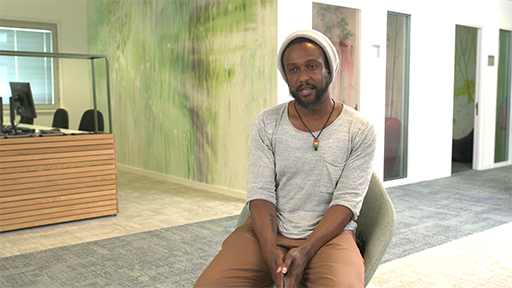1.2 Digital skills for the workplace
The COVID-19 pandemic accelerated the need for both digital transformation, and the ability to develop digital skills and capabilities, as individuals and organisations rapidly moved to new ways of working. Reports suggest that digital transformation has accelerated by about seven years during the height of the pandemic in 2020–21. At the point of the first lockdowns individuals and organisations achieved digital adaption (i.e. implementation of remote-working solutions) in an average of 11 days which pre-COVID may have taken years to implement (McKinsey & company [Tip: hold Ctrl and click a link to open it in a new tab. (Hide tip)] , 2020).
This has changed our ways of working and the associated digital capabilities we need in an unprecedented way, but the pandemic has also widened the digital divide – ‘the gap between people who have easy access to the benefits of digital technology and those who don’t.’ (Centre for Digital Public Services, 2022).
As organisations now adapt to new ways of working post-pandemic, many are permanently adopting a hybrid approach, with more than 80% of workers suggesting they planned to work in this way. Organisations need to plan for the long term, and involve both their staff and external organisations to build digital skills and integrate preventive measures to reduce the digital divide. Leaders need to develop their confidence, curiosity, and understand government and ‘industry’ strategies, in order to build digital capabilities that lead to effective digital transformation (ONS, 2022).
For higher education institutions (HEIs) it is also useful to consider the heightened digital capabilities and expectations of students alongside those of staff. This is because the experience of the new generation of students compared to previous generations has been different, and is influenced by the use of technology during the pandemic and the focus by government on digital skills within the curriculum. The Welsh Government, Education Wales Digital Competence Framework for schools provides a useful reference to understand the expectations for digital skills to be developed within schools.
When thinking about the digital skills required for hybrid working, focusing on the ‘employee experience’ from an organisational and individual point of view helps to ensure that the behaviour and the skills to use technology effectively can be considered together, to build the digital capabilities you require.
Some of the key behaviours and skills you may need to consider developing in your organisation to support hybrid working are listed in the table below.
| Behaviours | Skills |
|---|---|
| Empathy | Tools and systems |
| Communication | Collaborating online |
| Psychological safety and trust | Policies and processes |
| Collaboration | Data governance |
| Resilience | Online and offline security |
| Transparency | Managing information |
| Curiosity | Writing for digital platforms |
| Problem solving | Copyright |
| Team building | Equity, diversity, accessibility and inclusion |
| Sustainability | Digital sustainability |
It is useful to apply a digital lens to these behaviours as a way to think about how digital capabilities should look for you as an individual and in your organisation as a whole. Throughout this course and toolkit, we explore these skills further, and you may find that The Skills Toolkit created by the National Careers Service is a useful additional resource.
Activity 4 Skills for content creation
Watch the video in which Sas Amoah, a Digital Media Producer at The Open University, talks about the importance of digital skills and responsibilities.

Transcript
Drawing on the behaviours and skills in Table 3 above and the notes you made while watching the video, which are the areas you feel your organisation might wish to focus on?
